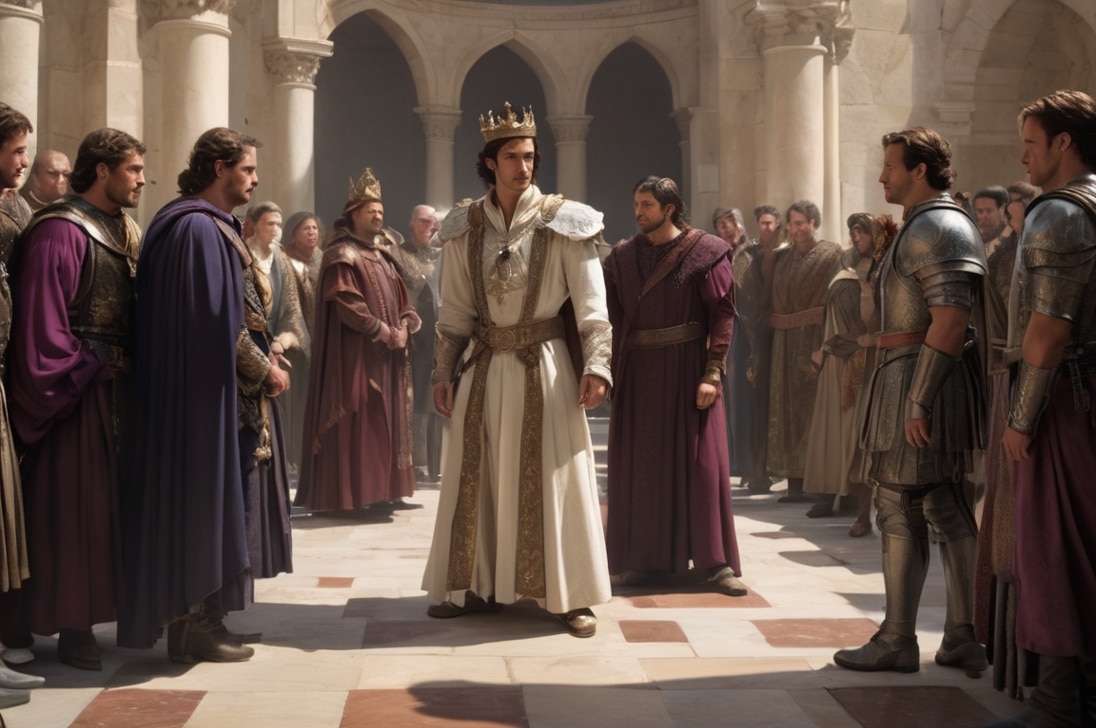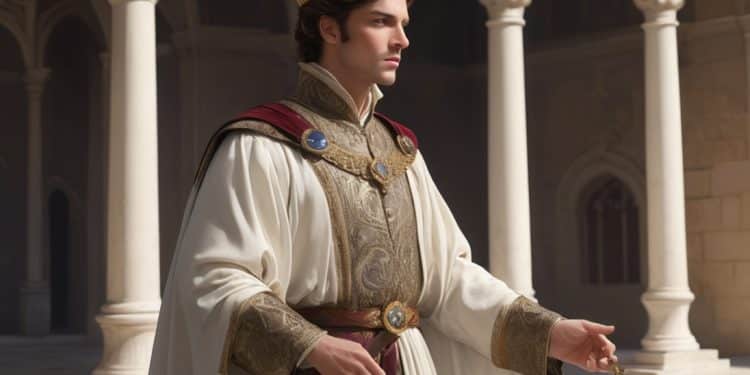Introduction
Literary enthusiasts often ask, Who is Prince Escalus in Romeo and Juliet? Well, Prince Escalus is a character in Romeo and Juliet who is the ruler of Verona. He was not so notable in the play except for the dialogue he delivers in Act 1 Scene 1, which is,
“If you ever disturb our streets, your lives shall pay for it.” Whoever sees this scene will condemn him as a loyal ruler of the city.
Prince Escalus is on the authority in Verona. In the story, he is juggling with conflict happening between the Montagues and Capulets. Well, Escalus doesn’t make any impulsive decisions like the young lovers of the play. He analyzes every reason that leads to conflicts and then takes action.
In the entire play, Prince Escalus was playing the role of the voice of law and justice. The way he dealt with Romeo and Tybalt was really appreciative. We also got to see a political side of him when he gave his heartbreaking speech. Whenever any conflict happens in the city, Escalus tries to manage them with sincerity. Well, there is more to know about him. So keep reading.
Who is Prince Escalus in Romeo and Juliet?

Prince Escalus is the ruler of the city, Verona. This city is divided into two feuds. One feud belongs to the Montague families, and the other feud belongs to the Capulet families. Lots of conflicts and chaos go on between the two feuds. But as a responsible leader, Prince Escalus has always tried to handle the chaos and maintain the city’s stability. Apart from political problems, he also handles his personal royalties wisely. So we can say that he is a minor character like Peter in the play Romeo and Juliet
Commitment to Peace
Since Prince Escalus gave his dialogue in Act 1 Scene 1, he has left a dedicated impression. The impression of commitment towards his city. Just see his dialogue. You can feel that Prince Escalus can do anything to save the peace of his city. This is not all. In Act 3 Scene 1, he banishes Romeo instead of sentencing him to death. Why? Because he wanted to keep everything fair. It’s not easy for Escalus to control violence every time he is in the position of authority.
Prince Escalus’s Role in Key Events
The Public Brawl In Act 1, Scene 1
A chaotic street fight was going on between the Montagues and Capulets. When Prince Escalus saw this, he intervened there. He became angry with them because they were disturbing the peace in Verona. Escalus warned them that if they do any further violence, they have to face the death penalty. At that time, his dialogue was, “Your lives shall pay the forfeit of the peace.” After seeing this moment, we could realize that Escalus becomes frustrated whenever the peace in the city hinders. And his main priority is to maintain public order.
Romeo’s Banishment In Act 3, Scene 1
Tybalt kills Mercutio, who was slain by Romeo. When everyone knew about it, they called Prince Escalus to serve justice and punish Romeo. Everyone was expecting the death sentence of Romeo. But Escalus didn’t do that. He showed mercy and didn’t give him any death sentences. But he told him to be banished from Verona. That moment showed a compassionate sign of Prince Escalus. However, Romeo’s banishment was a big downfall for all lovers.
Prince Escalus’s Role as a Symbol of Authority

Shakespeare uses symbols in his plays to convey thoughtful messages to his audience. In Macbeth, he used birds and witches as symbols.
Justice and Law
The conflicts between Montague and Capulet have created a lot of chaos in Verona. Amidst these, Prince Escalus always tries to maintain peace in the city. Whenever any conflicts arose between the warring families, Escalus tried to reconcile them. Sometimes, he also threatens them not to create any disturbance. And why won’t he? He is the legal authority of that city. In short, Escalus plays every role that’s important for justice and societal needs in the city.
Failure to Prevent Tragedy
Prince Escalus puts all his efforts into maintaining peace in his city. But sometimes his authority turns out to be insufficient to do it because of the sudden tragedies. Because the hatred between Montagues and Capulets is so deep that Escalus sometimes fails to curb their conflicts. No matter how much he tries, he often fails to resolve the feud completely. It shows that emotions and fate can be more overwhelming than the impotence of the law. And finally, when Romeo and Juliet died, Escalus had a sorrowful emotion for them. He then realized that even the well-intentioned authority can be overwhelmed when things don’t go under control.
Despite his efforts to enforce peace, Prince Escalus’s authority proves insufficient to prevent the tragedy that unfolds. His inability to control the deep-seated hatred between the Montagues and Capulets highlights the limitations of political power in curbing personal conflicts. Escalus’s failure to fully resolve the feud, even after multiple interventions, reveals the tragic impotence of law in the face of human emotion and fate. By the end of the play, his sorrowful reflection on the deaths of Romeo and Juliet underscores how even the most well-intentioned authority can be overwhelmed by forces beyond its control.
Prince Escalus’s Interactions with Major Characters

While Confronting the Montagues and Capulets
Throughout the play, we could see Prince Escalus’s frustration. This was with the Montagues and Capulets, who created disorder in the city. Escalus warned them many times not to do so. But this was not affecting the feuds. They were still having violent rivalry. Later, Escalus became so frustrated that he threatened death to everyone who was disturbing the peace of the city. You can see it in Act 1, Scene 1. Escalus did so because both families were ignoring his authority. He also interacted with the heads of both houses. They are Lord Capulet and Lord Montague. Escalus’s warning created tension between the feuds as he was in authority.
Relationship with Romeo and Mercutio
Prince Escalus’s character got more depth when he interacted with Romeo and Mercutio. It showed a different connection for him with the younger generation. In Act 3, Scene 1, you can see how sorrowful Prince was because of Mercutio’s death. He was deeply affected by it. Then, when Romeo kills Tybalt, Escalus doesn’t let his feelings overwhelm him. Instead, he did justice. He chose the banishment of Romeo rather than sentencing him to death. Escalus always acts fairly, even if it causes him personal loss. He tried to acknowledge the emotional realities and uphold the law.
Prince Escalus’s Contribution to the Play’s Themes

Law vs. Personal Revenge
In the play, Prince Escalus resembles a figure that ensures law and order. Because he always tries to serve justice and also because he is in authority of the city. But sometimes he needs to face some challenges because of characters like Romeo and Tybalt. These characters are always up for their revenge and never think of the legal consequences.
You can see in Act 3, Scene 1, that Romeo kills Tybalt out of revenge. Because Tybalt killed Mercutio before. So here, both of them violated Prince’s rules. So after Tybalt’s death, Escalus decided on Romeo’s banishment instead of punishing him to death. It looks like the prince is finding it difficult to maintain justice in the midst of several emotional conflicts.
Moral Responsibility of Leadership
We wouldn’t know who is Prince Escalus in Romeo and Juliet if he didn’t show his dedication. In the entire play, Prince Escalus’s role was reflecting the heavy moral responsibility. As the ruler of Verona, he has to balance justice and mercy among the members of the city. But it has become difficult for Escalus to do so because the violence between the Montagues and Capulets is increasing day by day.
In Act 5, Scene 3, you will see the prince deliver a lament, saying, “All are punished.” This moment was after the death of Romeo and Juliet. Unlike Macbeth, in Shakespeare’s other play named “Macbeth,” Romeo and Juliet die an honorable death, as Macbeth’s downfall was for his own mistakes. Escalus could realize that his authority has failed to stop the dispute among the two feuds. And because of the moral responsibility, he had to make balanced decisions every time.
Conclusion
So now we know who is Prince Escalus in Romeo and Juliet? In the play, Prince Escalus’s role was more of an authoritative figure. Throughout the play, his motive was to maintain peace in Verona. In this process, he faced tragedies also. For example, he banished Romeo for killing Tybalt. Then he had to give multiple warnings to the Montagues and Capulets. But lastly, we could see that his interventions did not affect them much because they were in deep emotional conflicts.
Amidst the family rivalries and personal vendettas, Escalus tried to establish law and order. However, he had to struggle a lot while maintaining his authority. Because the conflicts in society were deeper than the legal decrees. For this reason, Escalus couldn’t prevent the tragic events that led to the futility of the law. Because of Escalus’s role, we could see the glimpse of justice and power in the play. It was very hard for him to uphold the law and order in between the personal grievances. Not only Escalus, any other prince in this position may have failed to maintain peace in the midst of deep conflicts.


